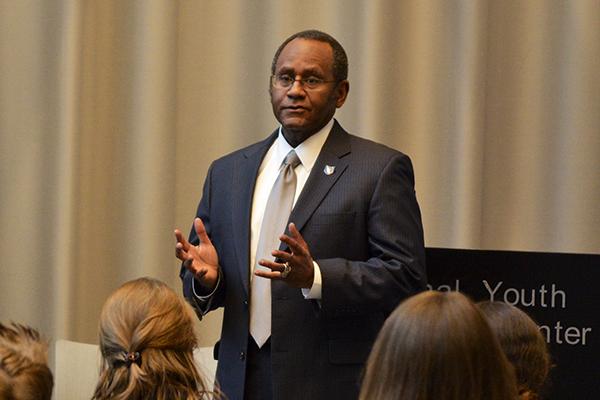GW’s highest-ranking veteran affairs official is leaving, and it seems unlikely that he will be replaced.
Student veterans are concerned about the future of their programs after the University announced Wednesday that Mel Williams, the associate provost for military and veteran affairs, will leave his role this month. Student veterans said losing a respected leader like Williams is a major blow, and their programs could suffer without someone advocating for them at the highest level.
During his three years at GW, Williams was the driving force behind establishing GW Veterans Accelerate Learning Opportunities and Rewards, the initiative that coordinates all military and veteran service offices. Over the last several years, officials have prioritized support for student veterans, bringing in veteran counselors and career advisers and creating a veteran-specific orientation.
Williams said in an email that he has enjoyed watching the success of VALOR students, and that he looks forward to the challenges of his new role as chief of staff for finance, operations and administration at the University of California, Davis.
“This has been an absolute privilege for me,” Williams said. “I am confident GW will continue its unwavering support for student military members, veterans and their families.”
Interim Provost Forrest Maltzman declined to say whether there are any plans to fill Williams’ position. GW’s announcement last week also did not reference any plan to search for a replacement.
Maltzman said that after Williams’ departure, students will be able to access all VALOR services through existing staff, who are working along with the provost’s office – a statement that repeated the exact wording from the original release.
“We do not have any other updates at this time,” Maltzman said in an email.
Since VALOR began in 2013, military and veteran student enrollment has increased by 200 students, bringing the current total to more than 1,700 students, according to the GW Veterans website. GW ranks No. 31 on the 2016 “Best for Vets” list from the Military Times.
Yannick Baptiste, the president of GW Veterans, said Williams’ departure creates an uncertain future for VALOR and veteran students.
“The creation of his position was something the GW community touted as another bullet point in their commitment toward the students and military students at GW,” Baptiste said. “Him leaving and not replacing him definitely begs the question – is that commitment still there?”
Baptiste said GW Veterans and officials in the Office of Military and Veteran Affairs have been preparing a plan to present to administrators that would restructure the office if Williams is not replaced.
While plans are still being discussed, Baptiste said the responsibilities and activities of VALOR could potentially fall under the jurisdiction of the student affairs office, which oversees GW’s housing office, the Center for Student Engagement and the Colonial Health Center.
He said an extensive support system for veterans is necessary because more are returning from combat as the U.S. de-escalates efforts overseas, and many will want to pursue an education. Veterans are a lucrative group of students for universities because their G.I. Bill benefits can pay up to the full cost of their education.
“Right now is the time where we should actually be trying to be as advantageous and as welcoming to veterans that are coming out right now because as the DoD winds out, they’re going to want to do something, and many of those are going to want to become students,” Baptiste said. “This is the time for GW to step up their support, not downgrade it.”
Veronica Hoyer, a student veteran and senior who was GW Veterans’ vice president last year, said she’s concerned Williams’ departure will cost student veterans leverage with officials.
Hoyer said student veterans have “no idea who’s going to take over,” and the University should include them if a search to replace Williams takes place.
“With how much the student org has worked with the University, including the creation of VALOR, why aren’t we part of the decision process for the transition of VALOR?” Hoyer said.
Emanuel Johnson, a 2015 graduate and the former president of GW Veterans, said having someone of Williams’ prestige was a recruiting factor for many student veterans who came to GW over the last few years.
Johnson said while Victoria Pridemore, the associate director of military and student services, is “extremely capable” of continuing to lead programs, someone of Williams’ caliber is an asset.
“It would be a disservice to the student veteran community, to GW at large, if they didn’t bring somebody else in to replace him and try to push forward the initiatives that he started,” Johnson said.
Williams is the second abrupt high-profile departure from the office in recent years. Pridemore was named to her position after the program’s former associate director, Mike Ruybal, suddenly left the University in September 2014.
Mike Connolly, the director of the Office of Military and Veteran Services at the University of Nebraska, Omaha, said the strength of their program depends on having representation at the administrative level.
“Without somebody at that level, it certainly makes it much more difficult to advocate for students with the type of whole-university approach it takes to care for veteran students,” he said.








